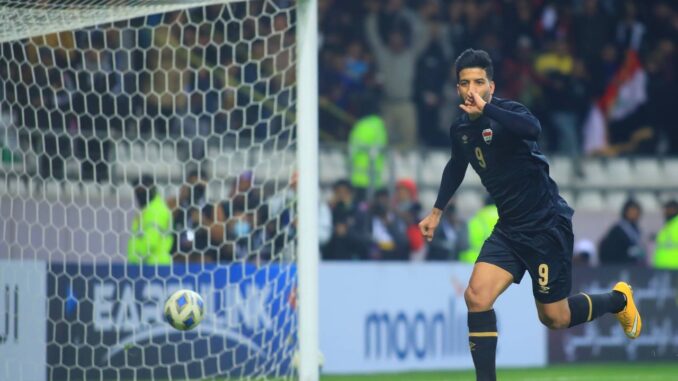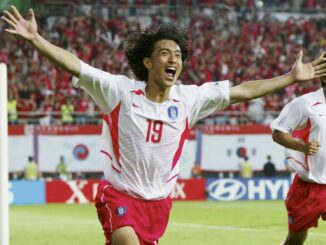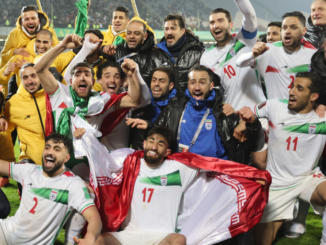
Through coaching changes, squad infighting and the incoming of a creative genius named Zidane, Iraq are down but not out in World Cup qualification.
Following Dick Advocaat’s resignation within six months of taking the helm, changes in the dugout and on the pitch are hoped to recalibrate their fortunes in search of their first World Cup appearance since 1986.
Back in August, the announcement that world renowned Dutch coach Dick Advocaat was taking the reins of Iraq was greeted with equal amounts of intrigue and cynicism.
Advocaat is undoubtedly a big name for a nation of Iraq’s standing in world football, even more so given the less than ideal political and logistical hurdles that would have accompanied the appointment.
Yet the acquisition felt inevitably short term, a blueprint that has become in vogue over the last couple of cycles in Asian World Cup qualification; an immediate, costly but rapid injection to boost momentum on the final stretch.
Advocaat’s arrival couldn’t have been better timed, following on the heels of Slovenian Srecko Katanec, who’s three year tenure as Iraqi coach was arguably the best they’d seen for some 20 years. Katanec offered stability, assurance and predictability; three lacking ingredients in Iraqi football for a long time.
His methodical, mutedly effective progression to Round 3 in June was, however, his last act as Iraqi coach. Cruelly squeezed out in favour of glossier options, he’s now taken on another sleeping giant of Asian football in Uzbekistan.
Fast forward less than four months and Advocaat handed in his resignation in November. While his exit was predictable in hindsight; with only two draws and four defeats from six matches, by the end many felt regret that the steady progress achieved by Katanec had been brushed away so easily in place of an all too familiar Iraqi football soap opera.
New coach, same old Iraq
Zeljko Petrovic, assistant under Advocaat since his days at Sunderland and Feyenoord, rather than returning full time to Europe, stayed on following his mentor’s exit, initially as interim coach for December’s Arab Cup, and subsequently extended until the end of World Cup qualification.
With only sporadic spells as head coach dotted between his understudy work, little was known of the Montenegrin coach prior to his appointment, with a seamless transition expected from his old boss’ tenure.
What clarity he lacks on paper, he’s already made up for in person. A quite expressive character, Petrovic’s early days – from candid press conferences to animated pitch side antics – have brought back the Iraq we all secretly hold a guilty masochistic pleasure for.
Take his first competitive match in charge, trailing Oman 1-0 into stoppage time at the Arab Cup, Aymen Hussain saw his penalty saved in the dying seconds.
However, with the referee calling for a retake following Oman keeper Ahmed Al-Rawahi straying off his line, Petrovic sought about stamping his influence on the match, storming onto the field to ensure Aymen relinquished penalty duties.
Substitute Hassan Abdulkareem stepped up to equalise for one of the more unforgettable moments of the tournament. Petrovic bizarrely became the cult hero of the moment, with the IFA even posting a video of his explanation for his sporadic outburst following the game.
That would be one of the only bright spots from Iraq’s Arab Cup campaign, going on to draw with Bahrain, before losing out to hosts Qatar. Iraq headed home before the knockouts for the first time in their Arab Cup history. Not for the first time, Iraq had made more headlines off the pitch, than on it.
Firepower concerns
Following Advocaat’s resignation, the experienced Dutchman was gracious in defeat, regrettably conceding that he wasn’t up to the high expectations outlined upon his appointment.
It was telling, however, after only three goals scored in his six matches in charge, that he pointed to a lack of firepower being his side’s true undoing.
Riding a wave of excruciatingly bad luck on the injury front, its all too obvious that Iraq have failed to find consistency in front of goal over this last year.
This cycle was supposed to be centred around 21-year-old rangy striker Mohanad Ali, who despite his struggles at club level, has regularly carried more than his fair share of the attacking burden on the international scene.
In Mohanad’s long term injury absence, Advocaat attempted to replicate some his influence in Aymen Hussain.
The muscular leading man hasn’t missed a beat since his transfer to Umm Salal in Qatar in the summer, but while his movement and physicality has created numerous opportunities, some sort of international hoodoo seems to be holding him back in an Iraqi shirt.
The penalty fiasco that concluded their Arab Cup opener rubbed further salt into Aymen’s wounds; not the new start under a new coach the former Air Force Club striker was looking for.
Advocaat also experimented with Ali Al-Hamadi of Wycombe Wanderers in England. Barely out of youth football, it felt like a risk, and while we saw glimpses of the future, a leading man in a WCQ campaign seems a level too far at present.
That leaves, Alaa Abbas, another striker with his fair share of bad luck and injury concerns. In what has been a bizarrely framed twelve months, the 24-year-old, who blitzed through the Iraqi Premier League with Al-Zawra, made his long-awaited move to Europe with Gil Vicente in Portugal.
A year later, a mixture of administrative roadblocks and injury setbacks compounded a move that never felt right from its conception.
Abbas’ talent isn’t under question, a much more versatile and artistic option than Aymen, his eye-catching goalscoring displays have regularly drawn plaudits since his youth days.
Now back in Iraq, and finding his feet at Air Force Club, Abbas seems to be Petrovic’s preferred option to lead the line, and while he failed to catch fire in Qatar at the Arab Cup, his spectacular bicycle kick winner in Friday’s friendly win over Uganda has underlined his selection ahead of this week’s qualifiers.
In this, Petrovic may benefit from timing rather than talent. Advocaat’s pains to find that crucial final piece to the puzzle always felt at odds with the expectation and system rather than the individuals at his disposal. With a couple of options now hitting form, Petrovic could be entering at the right time.
Looking to the future
Of course, as should always be appreciated, any positive vibes in Iraqi football are regularly tempered by a shambolic political and organisational effort off the field.
The IFA’s involvement in the national team remains over-bearing, while offering little assistance with basic infrastructure. The transition from outspoken TV pundit back into football as technical director of legendary striker Younis Mahmud has sought to conflate the situation further.
His influence in Iraqi football seems to already be undermining what Petrovic is trying to achieve. For the most part it seems well intended, but it has rarely helped having multiple puppet masters turning up in the same dressing room (as is apparent in that infamous post-Arab Cup video).
The FA’s tackling of age fraud, still prevalent to this day, also continues to hold back consistency and progression. As notable Iraqi football writer Hassanin Mubarak has investigated quite extensively, the practice has slowly caught up with the current national team, hidden by unique “administrative issues” with call ups due to passport inaccuracies.
Saad Abdulameer is a relevant case in point. The Iraqi captain at the 2016 Olympics, and a regularly consistent and methodical presence in the national squad, saw his international career abruptly end in 2019. Last week Saad made a somewhat surprising return following his three-year exile, finally being able (it has been reported) to solve his passport difficulties.
The longstanding feud between local stars and expatriate internationals is also an unwelcome sideshow. An argument that seemed well extinguished under Katanec threatens to take centre stage once more, firstly under Advocaat and now Petrovic.
Domestic talent feels harshly treated, overseas based players feel alienated in camp and by the media, putting the coach squarely in the firing line.
What is apparent, however, whichever side of the argument you sit on, Iraq continue to be unable to select their best squad, irrespective of fitness. What other World Cup chasing nation has such headaches?
Within the dark, however, comes a shining light, in the form of Manchester United teen sensation Zidane Iqbal. The 18-year-old, born in Manchester to Pakistani and Iraqi parents, looks set to prove IFA’s persistence was well worth it by opting for his mother’s homeland following a three way courting of his national service.
The creative midfielder, who made his UEFA Champions League debut late last year, has been called up by Petrovic this January, and is set to make his senior debut in the coming week.
While hopes will be high, expectations should be tempered given Iqbal’s fleeting experience in senior football to date. That said, youthful exuberance separate to a squad well worn by a disappointing (to date) qualification campaign, may prove the unique X-factor Iraq need on the WCQ back stretch.
The road to Qatar takes another turn
Given the passionate and fervent supporter base, as was so demonstrably on show for their home coming to Baghdad on Friday (nine years since their last international in the capital), the mood inside Iraqi football is regularly all or nothing. Any molecule of success is leapt on, any disappointment is amplified and dissected.
In truth, despite a modest record of two points from six matches in Round 3, Iraq remain in touch of the playoff picture for Qatar. Dictated partly by themselves, Group A has been broadly cagey yet moderately even, if you excuse Iran and South Korea’s vice-like hold on the automatic qualification places.
The fight for third remains wide open.
UAE haven’t yet lived up to their pre-cycle promises, Lebanon have levelled up their game significantly in the last twelve months, while Iraq and Syria have seemingly stagnated. The pack remains split by four points with four matches to play, between UAE on six points in third, and Syria on two at the bottom.
While results have been frustrating, performances have been far from terrible for Iraq. Their draw against Korea showed their solidity, they were three minutes away from beating UAE in the Emirates, were clearly the best side without a finishing touch against both Syria and Lebanon, and well in the game despite a late onslaught against Iran.
As for their Arab Cup campaign, two draws ahead of their final match, a late capitulation against the hosts and Asian champions Qatar, proved the difference in their progression hopes.
The ingredients are there for a late shakeup in qualification, as Petrovic eases into the role. Defensive solidity built by Katanec, and honed by Advocaat remains, while the converging form of Abbas and Aymen may prove timely.
The introduction of Zidane Iqbal to an already creative blend of Bashar Resan and Mohammed Qasim offers unpredictability and guile in the final third. A cool head around the noise could well steer this bolter from the pack.
In their way, a trip to the Azadi to face their perennial rivals Iran. Finely poised, with little expected of them before Lebanon in Saida, which you’d think they’d have to win if they want to stay in the mix. UAE and Syria as the final leg in March summarises how closely this run in could well be.
All eyes on Petrovic and the unpredictable beast that is Iraqi football then. Whatever happens, his and the nation’s mood will be polarised. Prepare for sheer adulation or crushing failure; an everyday ultimatum as the Iraqi national head coach.
Photo: twitter/SoccerIraq
Listen to Episode 77 of The Asian Game podcast as we discuss Iraq’s chances of qualifying amid all the chaos.




